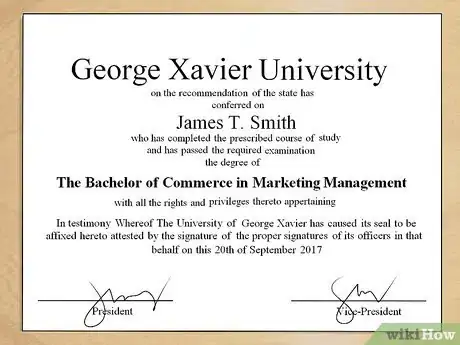This article was co-authored by wikiHow staff writer, Amber Crain. Amber Crain has been a member of wikiHow’s writing staff for the last six years. She graduated from the University of Houston where she majored in Classical Studies and minored in Painting. Before coming to wikiHow, she worked in a variety of industries including marketing, education, and music journalism. She's been a radio DJ for 10+ years and currently DJs a biweekly music program on the award-winning internet radio station DKFM. Her work at wikiHow supports her lifelong passion for learning and her belief that knowledge belongs to anyone who desires to seek it.
There are 7 references cited in this article, which can be found at the bottom of the page.
wikiHow marks an article as reader-approved once it receives enough positive feedback. In this case, 95% of readers who voted found the article helpful, earning it our reader-approved status.
This article has been viewed 165,450 times.
Learn more...
Talent managers are professionals who help performers handle their daily business. Although often confused with talent agents, the roles are different. Talent agents are licensed, and their main goal is to help performers book jobs. A talent manager, on the other hand, is not licensed. They handle scheduling and administrative tasks, provide support, promote upcoming activities, and offer guidance. Being a talent manager is usually a long-term role.
Steps
Developing the Right Background
-
1Become active in the performing arts. Get involved with local stage productions by auditioning for a role or volunteering to help backstage. Start or join a band, or try your hand at stand-up comedy. Dig into the performing arts in general and discover what you're passionate about.
- Your passions will help you decide what aspect of the industry you want to work in. For instance, you might immerse yourself in the work of important musicians and actors from the last 50 years, or explore the world of streaming radio.
-
2Obtain a 4-year degree in marketing or business. There is no formal coursework that teaches you to be a talent manager, but most roles call for at least a bachelor's degree. Choose a major that emphasizes skills in communication, finances, organization, and business matters. Talent management requires the use of these skills on a daily basis.[1]
- For example, undergraduate degrees in marketing, communications, public relations, or human resources are all great options that can help prepare you for talent management.
- Pursue a minor in fine arts to better understand the creative minds you will be working with.
Advertisement -
3Familiarize yourself with the entertainment industry. Many talent managers were once performers themselves or are connected to the entertainment industry in some way, such as being an acting teacher, producer, or theater critic. Explore ways you can get hands-on experience with the industry. For example, you could start a blog of film reviews, or apply for a summer job as a local theater director's assistant.[2]
-
4Identify the type of performer you want to work with. While talent agents may represent a large number of clients on behalf of their agency, talent managers usually represent and work closely with an individual. Knowing the kind of people you like to work with will be important to your success.[3]
- For example, if music is your passion, focus on working with musicians. If you want to work with actors, focus on the film, stage, or television industries.
Getting Started in the Industry
-
1Relocate to an entertainment industry hot spot. To work in the entertainment industry, you have to go where to action is. Depending on where you live, this could be New York, Los Angeles, London, Mumbai, Las Vegas, Tokyo, and so on. The closest major city is a great place to start. Choose a location that makes sense for the particular industry you want to work in.
- For example, if you want to work with musicians, go for New York, Los Angeles, London, Nashville, etc.
- For stage acting and entertainment, consider Las Vegas or New York.
- For television and radio, try the closest major city.
-
2Take a low-level position or internship with a management agency. Talent managers often start their careers in lower-level positions with management firms or agencies, and then work their way up to management. Take whatever job you can find with a talent management agency, such as an administrative or assistant role, and dedicate yourself to moving up the ladder.[4]
- If you can't find a talent management agency to work with right away, you can also learn more about the industry by working for producers, directors, or casting directors.
-
3Look for opportunities to take on more responsibility. As you gain more experience during your internship or position, look for the chance to assist in evaluating scripts, planning tours, or developing promotional packages. Take on extra projects and show a keen interest in learning more. Strive to be personable, reliable, and hardworking.[5]
- Working for a talent management firm allows you to be around a lot of different performers. Eventually, you may be given complete charge over a client, which could be the start of your career.
-
4Grow your network within the industry. As you advance your career, you will meet many important people in your industry. Focus on creating strong, lasting connections with talent and managers alike, growing your social and professional currency and relevance.
- Your connections will be valuable assets when you start working directly with clients, so view networking as a top priority.
Working as a Talent Manager
-
1Join a professional organization. Joining an organization such as the Talent Managers Association (TMA) gives you the chance to learn more about the business from your colleagues and find more networking opportunities. The TMA maintains an online registry of its members, who are required to follow the association's code of ethics.[6]
- There is no better way to advance your career than surrounding yourself with the best people working in the field.
-
2Be prepared to work closely with strong personalities. Unlike talent agents, who take a more reserved role in a performer's career, a manager works closely and personally with clients. You may have to navigate large egos, obnoxious behavior, emotional breakdowns, and stressful environments. You will need to provide support and counsel to your clients on both a personal and professional level, so be prepared to work intimately with them.[7]
- For example, you may need to calm down a client who's just broken up with her boyfriend. Their breakup has nothing to do with her career, but she comes to you for comfort and guidance nevertheless.
- In a more extreme example, you may have a troubled client who is experiencing problems with drugs and alcohol. You might have to take charge of the situation and help them check into rehab.
-
3Keep your client list small. To be an effective talent manager, you'll need to work closely with your clients every single day. This is a time-consuming role. Most talent managers limit themselves to having around 5 clients in total. If you are working with a particularly high profile client, you may want to work solely for them. Avoid spreading yourself too thin to keep your clients happy.[8]
-
4Communicate and meet with your clients frequently. You will need to interact with your clients almost every day to provide advice, assistance, and guidance. Touch base with them by phone or email each day when you get into the office. If needed, set up appointments with them, so you can go over their schedules or scripts in person.[9]
- Keep them on schedule by setting up reminders for appearances and shoots.
- Give them your thoughts about new roles they're considering, or their newest song or project.
-
5Meet with prospective clients. Attend actor's workshops, concerts, and events to scope out talent to add to your roster. Keep your particular strengths in mind and look for clients who can most benefit from those strengths. For example, if networking is your strong suit, consider working with up-and-coming talent in need of their next break. If you excel at organization and task management, consider taking on clients with established careers who need help managing their day to day activities.[10]
Community Q&A
-
QuestionHow old do I have to be to begin being a talent manager?
 Community AnswerIt doesn't matter the age. All you need is the zeal and passion for it, and let the zeal drive you.
Community AnswerIt doesn't matter the age. All you need is the zeal and passion for it, and let the zeal drive you. -
QuestionWhat if I do not take any additional courses than the biochemistry I already studied, can I still run a credible Talent Management Agency?
 Community AnswerAs long as you have the connections, skills, and work ethic, you can become a talent manager without any specific degree.
Community AnswerAs long as you have the connections, skills, and work ethic, you can become a talent manager without any specific degree. -
QuestionWhat subjects in middle school do I need to proceed to become a Talent Manager?
 Community AnswerAlthough there aren't many classes that will impact your career, beginning to learn about film or music while you are young will help you tremendously when you try to enter the field. Begin watching classic films and listening to historically important music in order to grow your understanding of the entertainment industry.
Community AnswerAlthough there aren't many classes that will impact your career, beginning to learn about film or music while you are young will help you tremendously when you try to enter the field. Begin watching classic films and listening to historically important music in order to grow your understanding of the entertainment industry.
Warnings
- Working as a talent manager requires long hours. You may find yourself working 12-hour days on weekdays and using your weekends to catch up on the clerical work you couldn't address during the week.⧼thumbs_response⧽
References
- ↑ http://learningpath.org/articles/Talent_Manager_Career_Summary.html
- ↑ http://learningpath.org/articles/Talent_Manager_Career_Summary.html
- ↑ http://learn.org/articles/What_Is_the_Job_Description_of_a_Talent_Manager.html
- ↑ http://learningpath.org/articles/Talent_Manager_Career_Summary.html
- ↑ https://www.shmoop.com/careers/talent-manager/salary.html
- ↑ https://www.talentmanagers.org/current-members
- ↑ https://www.shmoop.com/careers/talent-manager/
- ↑ https://www.backstage.com/magazine/article/agents-vs-managers-one-right-10047/
- ↑ https://www.shmoop.com/careers/talent-manager/typical-day.html
About This Article
To become a talent manager, start by getting into the performing arts scene by joining a band, taking a role in a production, or trying stand-up comedy. If you’re a more behind-the-scenes person, get to know the industry by starting a film review blog, or volunteering as stage help for a local play. Use these opportunities to figure out what industry you want to work in, whether that’s TV, film, or stage. At the same time, consider pursuing a 4-year degree in business or marketing, since most talent manager positions require at least a bachelor’s degree. For tips on how to get yourself to the right place and into the right position to start your career as a talent manager, scroll down!











































































